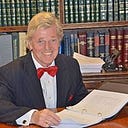It’s Time — to make the dream come true —
by John P. Flannery
On August 28, 1963, the Reverend Martin Luther King said:
“I have a dream that my four little children will one day live in a nation where they will not be judged by the color of their skin but by the content of their character. I have a dream today!”
There have been advances but, in recent years, since former President Donald Trump, we have had to run to stand in place, had to work to assure that character is the measure of the person.
We’ve lost ground since Trump.
The Reverend Martin Luther King compared himself to Moses who led his people out of slavery, saw the Promised Land, but never got there himself.
We’re still not there — though King showed us the way.
MLK’s promise was that “we, as a people, will get to the Promised Land.”
King’s road map to the Promised Land was to challenge “the triple evils of racism, economic exploitation, and militarism.”
Some have but not enough have — and time is running out on us.
We know today that the Supreme Court decision in Dred Scott, deciding that a man was property, was wrong.
But we don’t’ seem to appreciate that a Supreme Court that compromises voting rights is also wrong.
Consider how King fought so hard to remove obstacles to the franchise so that blacks could arrive in a polling booth and throw a voting lever so that they would have recourse against how they were badly or unjustly governed or treated.
As I write this comment, Iowa is preparing to have a Republican caucus to determine that party’s nominee. They are doing a caucus instead of a primary. We all know process is outcome determinative. They are giving tutorials on how it’s done. Why not do it right! Have a primary.
Beyond this backward electoral practice in Iowa, we have something a lot worse, a Supreme Court compromising the right to vote and other rights as well.
We have states interposing obstacles to that vote, working hard at it. They especially are concerned to compromise the franchise of persons of color.
King sought further to remedy an American system that valued property over persons and, in the bargain, short-changed workers in pay and benefits, and denied them credit, housing, education and many other opportunities — all because of race — this is a form of violence, economic, that is every bit as invidious and punishing as physical violence.
King was praised by many for his Ghandian ethic of non-violence in Montgomery, also on the Freedom Rides, in Albany, Birmingham and Selma.
King was dumb-founded therefore when the public and even his strongest supporters challenged his decision to oppose the war.
What might the Reverend have said or done about Iraq or Afghanistan or the war growing worse by the day in the mid-East — had he not been assassinated, cut down, because he taught unity and peace.
They told King that civil rights and peace didn’t mix.
King said, “the relationship of this ministry to the making of peace is so obvious that I sometimes marvel at those who ask me why I am speaking against the war.”
Our political candidates, and in this regard, we are talking about the emerged and emerging cultish Republican party, who talk compassion but do nothing compassionate.
They make light of feeding the poor, of housing, of job training, of helping the unemployed.
Senator Robert Kennedy said to those in South Africa, still fighting apartheid, that: “It is from numberless diverse acts of courage … that human history is thus shaped. Every time a man stands up for an ideal, or acts to improve the lot of others, or strikes out against injustice, he sends forth a tiny ripple of hope, and crossing each other from a million difference centers of energy and daring, those ripples build a current which can sweep down the mightiest walls of oppression and resistance.”
Martin Luther King believed that ripples of hope become forces of change.
We must believe as he did. We must act upon that political belief.
When I’ve campaigned over the years, and visited homes, door knocking we call it, I have seen pictures of King and the slain Kennedy brothers in a place in the home set aside. We have raised our eyes to inspiration. Now, we must act upon it.
We owe it to King and ourselves to resume our march forward, because while we may have seen the Promised Land, we’ve not arrived there yet, and we’ve been thrown for a loss.
This presidential campaign will determine for all time what kind of government we will have — whether no man is above the law, whether there is equal justice before the law.
When King spoke by the reflecting pool at the Lincoln Memorial, the rallying cry of the time, the optimistic battle cry of a movement that was not to be denied, was — “We shall overcome.”
In a kind of Joycean re-cycling, we are back there again and are called anon to service.
Jesse Jackson once said the Lord was not yet done with him.
Jesse seemed always to be there. He campaigned for me when I ran for Congress.
Jesse did his part. It’s time we did ours.
The times require it.
We shall overcome the darkness and we shall light the world again with hope and charity, as we restore our Republic.
On to November and Victory.
Ite in Pace!.
JPF
